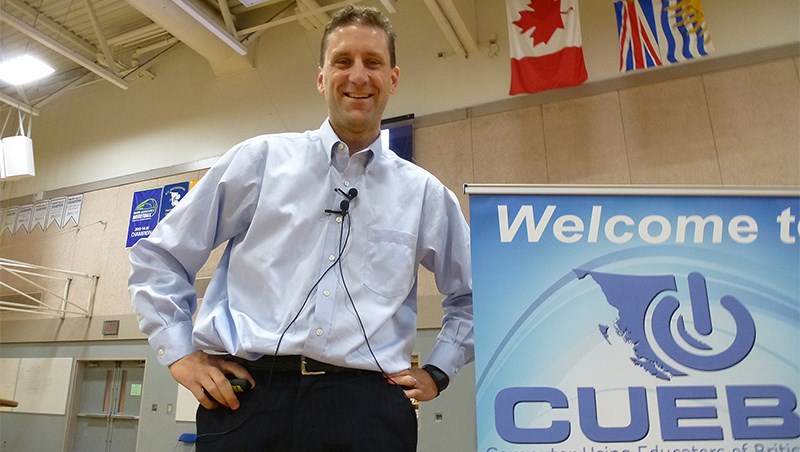Hundreds of B.C. educators learned tips and tricks for introducing coding into the curriculum at a conference held in Port Coquitlam.
Organized by the Computer Using Educators of BC for Friday's pro-D day and Saturday, the conference gave more than 600 teachers and administrators an opportunity to learn how to teach computational thinking and coding language to students, and ways to use technology to enhance learning.
A new website (codebc.ca) was launched to help teachers find resources for teaching coding, now an important topic expected to be covered in B.C.'s revised curriculum.
A number of the presenters at the event held at Riverside secondary were from School District 43 and the keynote speaker Friday morning was a former SD43 administrator.
Chris Kennedy, who is now the superintendent of West Vancouver School District, took stock of the latest trends in technology in schools, noting that some of the promise of social media has yet to be met while apps such as FreshGrade, an e-portfolio tool, and Techbook digital textbooks are becoming increasingly popular in the classroom.
Instead of simply doing the same work with technology that used to be done with paper, Kennedy said more teachers are experimenting with new ways to deliver the curriculum, such as bringing students outdoors to do research with their technology or bringing technology such as heart monitors into a PE class.
Kennedy also said students are signing up to join after-school coding and robotics academies, and kids as young as Grade 4 are allowed to bring their own devices such as tablets and smart phones for use in school.
That's a switch in tolerance of tech devices because as recently as five years ago, students were told to leave their cellphones at the principal's office, Kennedy said.
But with the move to new technology come challenges.
There is a danger that people lose contact with one another, and he urged teachers to use technology to encourage collaboration. In one video, a teacher used an app to encourage struggling students to privately share their concerns with her.
"What we are trying to do is find little ways that tech connects us together better," Kennedy said.
He also said he would also like teachers to do more to encourage students to blog, sending their creativity out to the world, but he acknowledged it's hard to do because of concerns about criticism and the hard work of writing and the fact that many blogs aren't well read.
"Blogs are like jazz music," said Kennedy, who writes a blog called Culture of Yes, "it has a following but we're not all listening to jazz every day."



